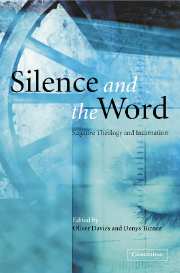Book contents
- Frontmatter
- Contents
- Notes on contributors
- Preface
- Introduction
- 1 Apophaticism, idolatry and the claims of reason
- 2 The quest for a place which is ‘not-a-place’: the hiddenness of God and the presence of God
- 3 The gift of the Name: Moses and the burning bush
- 4 Aquinas on the Trinity
- 5 Vere tu es Deus absconditus: the hidden God in Luther and some mystics
- 6 The deflections of desire: negative theology in trinitarian disclosure
- 7 The formation of mind: Trinity and understanding in Newman
- 8 ‘In the daylight forever?’: language and silence
- 9 Apophasis and the Shoah: where was Jesus Christ at Auschwitz?
- 10 Soundings: towards a theological poetics of silence
- Select bibliography
- Index
4 - Aquinas on the Trinity
Published online by Cambridge University Press: 22 September 2009
- Frontmatter
- Contents
- Notes on contributors
- Preface
- Introduction
- 1 Apophaticism, idolatry and the claims of reason
- 2 The quest for a place which is ‘not-a-place’: the hiddenness of God and the presence of God
- 3 The gift of the Name: Moses and the burning bush
- 4 Aquinas on the Trinity
- 5 Vere tu es Deus absconditus: the hidden God in Luther and some mystics
- 6 The deflections of desire: negative theology in trinitarian disclosure
- 7 The formation of mind: Trinity and understanding in Newman
- 8 ‘In the daylight forever?’: language and silence
- 9 Apophasis and the Shoah: where was Jesus Christ at Auschwitz?
- 10 Soundings: towards a theological poetics of silence
- Select bibliography
- Index
Summary
That God is one and three is, of course, for Aquinas a profound mystery which we could not hope to know apart from divine revelation, but we can only begin to understand what he has to say about it if we recognise that for him God is a profound mystery anyway. There are people who think that the notion of God is a relatively clear one; you know where you are when you are simply talking about God whereas when it comes to the Trinity we move into the incomprehensible where our reason breaks down. To understand Aquinas it is essential to see that for him our reason has already broken down when we talk of God at all – at least it has broken down in the sense of recognising what is beyond it. Dealing with God is trying to talk of what we cannot talk of, trying to think of what we cannot think. Which is not to say that it involves nonsense or contradiction.
This similarity is sometimes obscured for us by the fact that Aquinas thinks we can prove the existence of God by natural reason whereas such unaided natural reason could tell us nothing of the Trinity. This, however, does not, for him, make the latter a mystery where the former is not, for he thought that to prove the existence of God was not to understand God but simply to prove the existence of a mystery.
- Type
- Chapter
- Information
- Silence and the WordNegative Theology and Incarnation, pp. 76 - 93Publisher: Cambridge University PressPrint publication year: 2002
- 1
- Cited by

